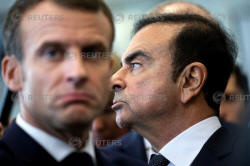Seeds of Renault-Nissan crisis sown in Macron's 'raid'
 Send a link to a friend
Send a link to a friend
 [November 28, 2018]
By Laurence Frost and Michel Rose [November 28, 2018]
By Laurence Frost and Michel Rose
PARIS (Reuters) - The arrest of
Renault-Nissan boss Carlos Ghosn has triggered new attempts by the
Japanese carmaker to shake off the control of its French parent - adding
to the problems piling up on President Emmanuel Macron's desk in the
Elysee Palace.
But this one, more than most, may be of Macron's own making.
In April 2015, as a 37 year-old economy minister with then-unknown
presidential ambitions, Macron ordered a surprise government stake
increase in Renault, designed to secure double voting rights for the
state. The overnight move profoundly rattled the Japanese end of the
Renault-Nissan alliance.
In the ensuing eight-month boardroom fight between Macron's ministry and
Hiroto Saikawa - Nissan's second-in-command at the time - many now see
the seeds of today's crisis.
When Ghosn's Gulfstream touched down in Tokyo on Nov. 19, prosecutors
were waiting. Nissan, the company he rescued from bankruptcy and had
overseen for almost two decades, outlined allegations of financial
misconduct against its chairman and said governance had been eroded by
Renault's control.
Saikawa has since contested Renault's right to appoint executives and
directors under the alliance master agreement, in correspondence seen by
Reuters. Such fundamental differences now threaten the future of the
partnership, which rivals Volkswagen and Toyota on the global auto
industry stage.
"President Macron himself has skin in the game," Max Warburton, an
analyst with New York-based asset manager AllianceBernstein, said this
week.
"He must recognize that his decision in 2015 to increase the French
state's holding in Renault ... likely impacted Japanese perceptions of
the alliance and heightened concerns that Nissan was ultimately within
the control of the French government."

The Elysee declined to comment, but an adviser said the president had
"no regrets" about the events of 2015.
Macron, who surged to victory in elections last year to became France's
youngest president, now finds himself battling street protests and
record low approval ratings. The Renault-Nissan crisis may draw more
attention to the risks of his bold interventionism, once seen as
refreshing.
The year before his move on Renault, the government under Socialist
President Francois Hollande had passed the Florange law. Named after a
steel furnace whose closure became a symbol of decline, it doubled
voting rights for long-term investors - chief among them the French
state - in any listed companies that did not opt out via a shareholder
vote.
COURTESY CALL
Over several months starting in late 2014, Macron, a former Rothschild
dealmaker, tried in vain to dissuade Ghosn and the Renault board from
proposing an opt-out at the company's April 30 general meeting. With a
15 percent stake in the carmaker and an only slightly larger share of
the vote, the government seemed likely to lose such a face-off.
Then, on the evening of April 7, Macron called Ghosn to let him know -
as a courtesy - that the state had bought another 4.73 percent of
Renault for 1.2 billion euros ($1.4 billion), would announce its
maneuver in the morning and planned to sell back down to 15 percent only
after defeating his opt-out.
"He would always go in with guns blazing," a former minister said of
Macron. "Only then would the real power dynamics of the situation
register."
With that step, seen by detractors and admirers alike as an
unprecedented government "raid", the simmering battle of egos between
Ghosn the global CEO and Macron the wunderkind banker-turned-minister
had burst into the open.
Brushing aside warnings, Macron pressed ahead and defeated the opt-out.
The vote handed France an effective blocking minority at Renault, which
in turn controlled Nissan shareholder meetings via its 43.4 percent
stake in the Japanese firm.
Alarm bells rang in Tokyo as that sank in, ratcheting tensions higher
over the months that followed. Nissan threatened to exit the Restated
Alliance Master Agreement (RAMA) - a radical step that would have freed
it to buy up shares in its smaller French parent, and end or reverse
Renault's control.

"The governance of Renault and consequently the autonomy of Renault
management, which have been the basis of trust (for) the alliance, will
be significantly impacted," Saikawa wrote in a Sept. 3, 2015, note to
the Renault board obtained by Reuters.
A Nissan spokesman declined to comment for this story.
Macron's staff initially dismissed Saikawa's demands - that Renault sell
down its controlling Nissan stake, restore voting rights to Nissan's 15
percent Renault holding and relinquish control of the alliance - seeing
them as dictated by Ghosn, who at that point remained Nissan CEO.
[to top of second column] |

French President Emmanuel Macron and Renault CEO Carlos Ghosn visit
the Renault factory in Maubeuge, France, November 8, 2018. Etienne
Laurent/File Photo

"When Ghosn talks about what Nissan and Japan think, he's speaking for himself,"
an official at the French agency that oversees state shareholdings said at the
time. "It's all rubbish as far as I'm concerned."
MACRON MISJUDGED
Fast-forward three years: Ghosn is gone, detained for now in a Tokyo cell to
face accusations that he misappropriated Nissan assets, misrepresented company
investments and - partly as a result - massively under-reported his real
compensation. He denies the allegations, according to NHK television.
And yet the same Nissan demands are back on the table.
"The terminology, the phrases and vocabulary we're hearing today are much the
same as in 2015," said another former French government official, now an
investment banker.
"We didn't believe Ghosn when he presented the Japanese position, but in fact it
was no invention."
Macron's pressure for a full Renault-Nissan merger also raised hackles in Japan
months before the Nissan whistleblower probe that led to Ghosn's arrest and
ouster as chairman.
Having previously insisted that France would first have to sell its Renault
stake, Ghosn agreed this year https://www.reuters.com/article/renault-nissan-alliance/renault-nissan-ready-to-merge-if-france-exits-stake-ceo-idUSL5N1FV1U4
to explore a closer tie-up in return for the renewal of his Renault CEO contract
with government backing, and he then revived deal talks.
This week, executives from Renault, Nissan and Nissan-controlled Mitsubishi
<7211.T> are gathering for the first time since Ghosn's arrest. The Amsterdam
meetings are aimed at keeping shared plants and programs ticking over in the
sudden absence of a global leader, and averting conflict.
But as the appointments dispute threatens to escalate into a new boardroom
fight, Renault's hand is critically weakened by another deal Macron struck to
end the last stand-off.
At the end of 2015, as tension mounted over Nissan's threat to sever alliance
ties, France agreed https://www.reuters.com/article/us-renault-nissan/renault-nissans-french-peace-deal-leaves-investors-underwhelmed-idUSKBN0TU17R20151212
to cap its Renault voting rights at 18 percent for most non-strategic decisions.
But the Macron-backed "stabilization" agreement went further, with a binding
pledge by Renault never to oppose the Nissan board at a company shareholder
meeting. In the now-unfolding tussle over directorships, that is a handicap.

The reversal was a staggering "failure of oversight" from a government that had
intervened to protect what it saw as Renault's interests, according to Loic
Dessaint, CEO of Proxinvest, a Paris shareholder advisory firm.
"It's nothing less than the abandonment of Renault's rights over its main
asset," Dessaint said on Tuesday. "Renault has effectively forfeited its votes
in Nissan."
He added: "Now we're approaching a situation where they realize too late it's
had an impact on their negotiating position. The alliance power balance is
already upended."
DISTRACTIONS
When approached by Reuters, former president Hollande declined to comment on his
administration's handling of the voting rights saga of three years ago.
But Macron's cabinet colleague said he seemed distracted towards the end of the
year when - as is now known - he was preparing to launch En Marche, the
political party that eventually carried him to the presidency. The web address
en-marche.fr was registered on Jan. 7, 2016, less than four weeks after the
Renault-Nissan deal was brokered.
"It didn't prevent him from being very engaged with his dossiers, given his
intelligence and capacity for work," the ex-minister said. "But they were no
longer his main concern."
Ghosn also bears some responsibility for escalating his 2015 battle with the
economy minister, he added.
"Ghosn had the absolutely insufferable conviction that he was above dealing with
ministers, so he'd only ever consider talking to a prime minister - which I
doubt endeared him much to Macron, who was also rarely unaware of his own
significance."
At least part of that verdict was shared by another cabinet colleague,
Christophe Sirugue, when asked about his relationship with Renault's CEO a year
after the dispute was settled.
"With Carlos Ghosn? You have got to be kidding," said Sirugue, then industry
minister for Europe's third-ranked economy - and Renault's biggest market. "As
far as he's concerned I don't exist."
(Reporting by Laurence Frost and Michel Rose; Additional reporting by Elizabeth
Pineau and Gilles Guillaume; Editing by Mark Potter)
[© 2018 Thomson Reuters. All rights
reserved.] Copyright 2018 Reuters. All rights reserved. This material may not be published,
broadcast, rewritten or redistributed.
Thompson Reuters is solely responsible for this content. |